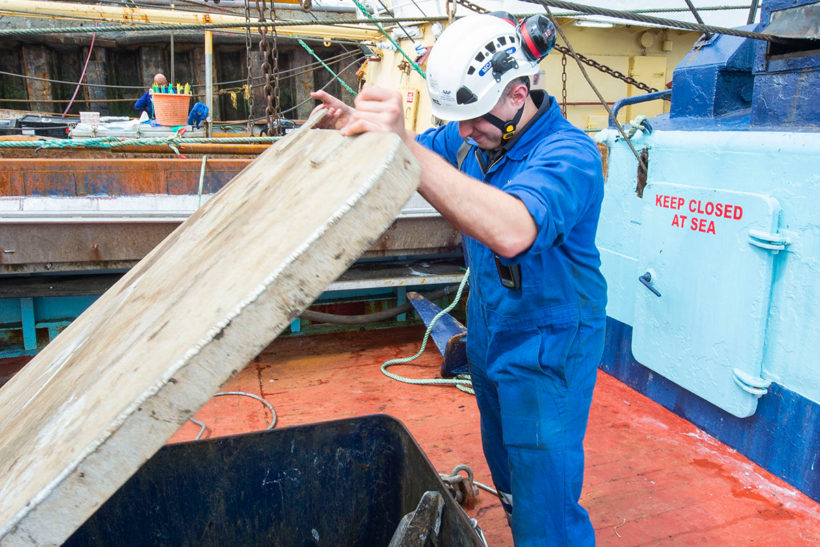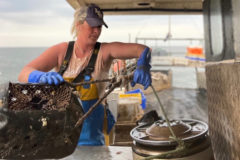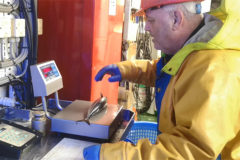Solicitor and qualified fisher Jo Pummery shares inside information on how to navigate the regulations
I don’t want to discourage you from reading this article by saying that the new 2022 regulations regarding entering and/ or working in enclosed spaces will not take effect for fishing vessels until 14 May, 2023.
This is to give owners and skippers sufficient time to ensure they are ready to comply with the practices and procedures required to make sure that crewmembers and other persons entering enclosed spaces onboard their vessels are adequately protected – so it’s important to take action now.
The requirements under the new The Merchant Shipping and Fishing Vessels (Entry into Enclosed Spaces) Regulations 2022 are explained in MGN 659 (M+F). They provide, for the first time, a clear definition of an enclosed space as being ‘a space which is not designed for continuous worker occupancy, and has either or both of the following characteristics:
- limited openings for entry and exit
- inadequate ventilation.’
An enclosed space will include any area which has been closed and without ventilation for a period of time, such as RSW and vivier tanks, fuel tanks, bait stores, fishrooms, freshwater tanks, sea or freshwater ballast tanks, net stores, chain lockers, void spaces, and stores containing chemicals.
MGN 659 (M+F) confirms that ‘in enclosed spaces, the environment can develop an oxygen-deficient, oxygen-enriched, flammable and/or toxic atmosphere, all of which are hazardous to human health’.
The previous regulations, The Merchant Shipping (Entry into Dangerous Spaces) Regulations 1988, did not apply to fishing vessels. However, following a recommendation from the MAIB, the 2022 regulations were extended to apply to a wider range of vessels, including fishing vessels.
This followed several serious accidents onboard vessels investigated by the MAIB, including one involving multiple losses of life, on the EFFV Viking Islay in 2007, where crewmembers entered an enclosed space to attempt a rescue but quickly became similarly overcome by the toxic atmosphere. Six people died over a 10-year period between 2009 and 2019 whilst working in confined spaces in UK ports.
Whilst there are currently no regulations applicable to enclosed spaces on fishing boats, guidance applying to fishing vessels was issued by the MCA as long ago as 2006; this can be found in MGN 309 (F). The note warns about the unseen risks from the build-up of gases in enclosed spaces, and provides guidance on the avoidance of such risks.
Whilst the deadline for complying with the new regulations has been extended to 2023 for fishing vessels to give owners and skippers sufficient opportunity to become compliant, it is important that steps are taken to do so at the earliest opportunity – not just to save lives, but because breaching the regulations will become a criminal offence. The vessel could be detained, and fines or a prison sentence imposed, for non- compliance.
Steps to compliance
Some of the new regulations do not apply to fishing vessels – for instance, regulation 6 (entrances to enclosed spaces to be kept closed), regulation 8 (drills to be carried out at least every two months) and regulation 9 (appropriate portable atmosphere-testing equipment to be carried).
The absence of a requirement for fishing vessels to carry out drills in relation to enclosed spaces does not affect other drills that must be carried out onboard and recorded, including drills on muster stations, fire, collision/grounding, and hull damage/taking water/sinking and abandoning ship.
Regulation 7 does apply to fishing vessels. This requires owners, skippers, crewmembers and others to ensure they have a system of work which provides:
- A system for entry into, and working in, enclosed spaces, provided and maintained in accordance with regulation 5 (general duties) of the Merchant Shipping and Fishing Vessels (Health and Safety at Work) Regulations 1997.
- Assessments of risks of entry into, and working in, enclosed spaces made in accordance with regulation 7 (risk assessment) of the 1997 regulations.
The skipper is required to ensure that the systems of work referred in point 1 are observed onboard.
No person may enter or remain in an enclosed space, unless acting in accordance with the systems of work referred to in point 1.
Paragraph 7.3 of MGN 659 (M+F) provides additional detail regarding the usual requirements when following procedures to assess risks. If more information is required, it advises that you refer to the guidance document ‘Fishing Vessel Risk Assessment and Safety Management Systems’, published by the MCA in April 2021. Particular advice regarding assessing risk in relation to enclosed spaces in the MGN includes:
- Considering the environment and activity as a whole, and factoring in any other potential safety hazards, such as low lighting and reduced visibility, trip hazards, low ceilings and narrow walkways.
- Risks caused by activity that may cause a change in atmosphere, such as hot work and use of paints, glues and coatings.
- Considering the ship design and layout as a hazardous environment.
- Spaces that are connected to or adjacent to enclosed spaces due to the migration of invisible gases, and the fact that atmospheres can change over time.
- The ability of fish to decay and release chemicals into the atmosphere.
It is a requirement of the new regulations that the secretary of state reviews their operation and effect, considers whether their objectives have been achieved, and publishes a report every five years, recommending whether they should be amended or revoked.
So now would be a good time to ensure that your vessel’s risk assessments and systems of work have been updated to include enclosed spaces. As well as providing MGN 659 (M+F), the MCA has also published leaflets and posters to raise awareness of safe procedures surrounding enclosed procedures, which you may find helpful, here.
Jo Pummery, a solicitor with the specialist marine law firm Bartons, is a qualified new-entrant fisher who has been to sea on several commercial fishing trips.
Bartons is an award-winning law firm that also specialises in fishing-related personal injury matters and in the sale and purchase of fishing vessels, as well as representing fishermen, owners and fish producers in MMO, IFCA, MCA or HSE interviews and investigations.
To discuss any fishing-related legal issues, please call Jo or the team on: 01752 675740.
Further details can be found here.
This story was taken from the latest issue of Fishing News. For more up-to-date and in-depth reports on the UK and Irish commercial fishing sector, subscribe to Fishing News here or buy the latest single issue for just £3.30 here.






